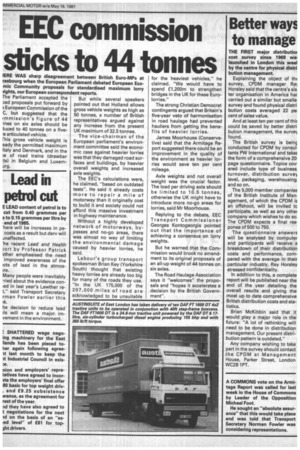EEC commission sticks to 44 tonnes
Page 5

If you've noticed an error in this article please click here to report it so we can fix it.
IERE WAS sharp disagreement between British Euro-MPs at rasbourg when the European Parliament debated European Ecomic Community proposals for standardised maximum lorry .ights, our European correspondent reports.
The Parliament accepted the pad proposals put forward by ) European Commission of the C, but suggested that the Immission's figure of 44 pies on six axles should be Juced to 40 tonnes on a fivee articulated vehicle.
rhis gross vehicle weight is eady the permitted maximum Italy and Denmark, and in the ;e of road trains (drawbar Its) in Belgium and LuxemJrg. But while several speakers pointed out that Holland allows gross vehicle weights as high as 50 tonnes, a number of British representatives argued against any increase from the present UK maximum of 32.5 tonnes.
The vice-chairman of the European parliament's environment committee said the economic case against heavier lorries was that they damaged road surfaces and buildings, by heavier overall weights and increased axle weights.
The EEC's calculations were, he claimed, "based on outdated tests". He said it already costs more to repair a mile of motorway than it originally cost to build it and society could not afford this massive investment in highway maintenance.
Without a highly developed network of motorways, bypasses and no-go areas, there was almost no way of limiting the environmental damage caused by heavier lorries, he said.
Labour's group transport spokesman Brian Key (Yorkshire South) thought that existing heavy lorries are already too big for many of the roads they use. "In the UK 175,000 of the 2 07,00 0 miles of road are acknowledged to be unsuitable for the heaviest vehicles," he claimed. "We would have to spend £1,200m to strengthen bridges in the UK for these Eurolorries."
The strong Christian Democrat contingents argued that Britain's five-year veto of harmonisation in road haulage had prevented hauliers from getting the benefits of heavier lorries.
James Moorhouse (Conservative) said that the Armitage Report suggested there could be an improvement in the quality of the environment as heavier lorries would save ten per cent mileage.
Axle weights and not overall weight was the crucial factor. The load per driving axle should be limited to 10.5 tonnes, otherwise the UK might have to introduce more no-go areas for lorries, said Mr Moorhouse.
Replying to the debate, EEC Transport Commissioner Georges Kontogeorgis pointed out that the importance of achieving a consensus on lorry weights.
But he warned that the Commission would brook no amendment to its original proposals of an all-up weight of 44 tonnes on six axles.
The Road Haulage Association says it "welcomes" the proposals and "hopes it accelerates a decision by the British Government".




































































































































